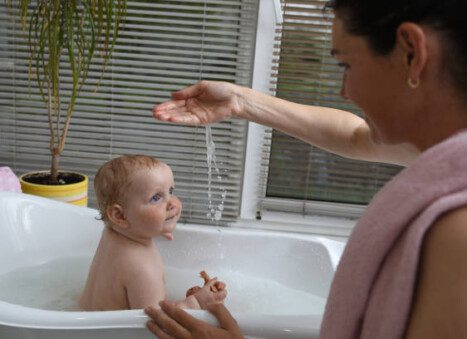
False Start Bedtime: What Are The Reasons And How To Solve Them
Okay, so imagine it this way. You finally prepare your baby for sleep at night, and you are all set to get some good sleep for yourself, too. You put them down for the nap, and surprise! They just wake up within 40 minutes. Yes, this is what a false start at bedtime looks like, and it is painful.
False start are pretty common, and you are not the only one who is experiencing it. However, it might become quite troublesome for parents when their babies just do not want to sleep. There are multiple reasons that might trigger a false start at bedtime, such as separation anxiety, lack of sleep pressure, discomfort or pain, overtiredness, connecting sleep cycles, and hunger.
Just to ensure that you are not the only one going through this, here is what one of our Reddit users has to say about their little one’s false start bedtime –
“LO is exactly 5 mos. We sleep trained with CIO at 4 mos + 5 days. Things have significantly improved after CIO. Bedtime goes beautifully. She’s placed in her crib awake and she falls asleep without crying usually within 5 mins. However, we are still left with one false start after the first 45 mins of sleep. This happens every night. The false start is hard crying, and usually lasts 10 mins before she goes back to sleep on her own. Only once did it last 20 mins. She will then sleep until her one feed which is early in the morning, anywhere between 4am-6am. Then she is placed back in her crib and goes back to sleep/continues sleeping until wake time.”
So, if you want to know more about your baby’s false start bedtime and the ways to fix it, stay with us till the end of the article, and you shall find out.
What Is A False Start Bedtime In The First Place?

A false start bedtime, in the simplest words, means when your baby treats their bedtime as a nap and wakes up shortly after you wake them up from their nap. Generally, a false start bedtime comes with the baby waking up pretty quickly after you put them to bed. They will hardly sleep for around 30 to 50 minutes or around one sleep cycle or less.
A lot of parents often question their babies waking up pretty frequently at night, but there is nothing that you need to worry about. This is possibly one of the most common things that your child might exhibit during their early days.
When your baby sleeps for more than one hour, it means they are able to connect to their next cycle on their own, and waking up every couple of hours is pretty normal in biological terms. So, a false start bedtime should only be a concern when the baby wakes up every 30 to 40 minutes. The rest of it is normal.
“We have never intervened during a false start, and just let her cry it out. Same when she occasionally fusses during the night, we let her be. If she fusses after 4am that’s when I do a feed. When she fusses sometime later in the morning after a feed, we also let her be. If she is crying and it’s already after 6am, we just treat that as her wake up time. But she consistently sleeps until at least 630am.”
Reasons Behind False Start Bedtime

There are a number of reasons as to why your little one might be quite a few. As parents, you need to be aware of these reasons and identify them accordingly so that you do the right thing to fix their sleep.
“I’m completely at a loss. I feel like I’ve tested every variable and it hasn’t worked. I’ve shortened wake windows, extended wake windows, moved feedings around to ensure he’s not waking out of hunger, later bedtime, earlier bedtime, dropped a nap, added a nap, gas drops, teething remedies, room temperature, everything. In the last week it’s gotten progressively worse which appears to be the dreaded 4 month sleep regression rearing its ugly head. We’re not waking up every 45 minutes at night yet, but he requires more intervention to get back to sleep at the beginning of the “Jack in the Box” period (picking up and rocking).”
Low Sleep Pressure
Sleep pressure is the sleepy feeling that we experience after a long day. Babies tend to experience it more than adult humans, which makes it understandable why babies are sleeping throughout the day. For babies to fall asleep, it is important that they have the right sleep pressure by bedtime.
If your baby is not falling asleep, keeps playing during their sleep hours, or is giving a false start at bedtime. It might happen that they do not have the right sleep pressure to fall asleep.
Overtiredness
Overtiredness might also be one of the reasons why your baby is not sleeping for long hours. When babies get too exhausted or overtired, their body releases a certain hormone that, in turn, increases the adrenaline count in their body.
With all the adrenaline running in their bodies, it becomes quite difficult for them to fall asleep or keep sleeping for a long time.
Discomfort Or Pain

False start bedtime might also happen because your baby is experiencing pain and is not able to communicate it. It is particularly difficult for them to sleep peacefully when their tummy is hurting or when they have a tooth coming out by piercing their gums.
There are many reasons for this, and some of them are more difficult than others. As a parent, you just need to keep a firm eye on the exact symptoms that your little one is showing to understand what you need to do to make them feel better.
Sleep Environment
The place where you make your baby sleep also decides how well the baby is going to sleep. If it is not a very soothing, calming environment, there is no way that they are going to sleep comfortably.
A loud and bright environment can never be the best place for the baby to take a nap. Always make sure to keep the room they sleep in calm and dark.
Separation Anxiety
Babies experience separation anxiety more than anyone else. They rely on their parents for everything. So, it should not be surprising to see that they want their parents around all the time. To help with this, you may try to sleep in the baby’s crib for a while so that it gets your scent.
When they become a little older, you may also go for a small attachment toy that will comfort your baby while they are sleeping.
Hunger
If your baby falls asleep during their bedtime feed or sleeps a couple of hours after dinner, it might happen that they are waking up simply because of hunger. No matter what you do, if your baby is hungry, there is no way that you can make them sleep throughout the night.
So, make sure that your baby’s sleeping sessions align rightly with their feeding sessions so that they have their bellies full before going to bed every night.
How To Fix Your Baby’s False Start Bedtime?
False start bedtime is more common than you think, and almost every newborn experiences it in their developmental process.

However, there are a few things that you can do to help them overcome the situation with ease.
Don’t Confuse Purple Crying With Tiredness
The time of purple crying, or the witching hours, is one of the most developmentally normal phases that your kid goes through.
The witching hour starts when they are around two weeks old. It starts with their little one becoming more fussy than ever, particularly during the late afternoons and evenings.
When they reach the age of six to eight weeks, this phase of fussiness reaches its peak. However, it slowly decreases and stops completely when they are three or four months old.
During this time, it is pretty common for the little ones to wake up shortly after falling asleep. You just need to be more patient with them and understand if they are actually giving a false start or are just going through the witching hour phase.
“We were told that it happens to every baby, but it varies in intensity and the length of time it occurs. If I remember right it started around one month old and was done around three months old, but even then, the purple cry period was only like an hour or so max. And it could be soothed fairly easily by taking her outside under a couple of trees. Something about the leaves and the sky really helped calm her down.”
Avoiding The False Start Bedtime Routine Because Of The Witching Hours
If your baby routinely wakes up at the same time every night, you can try to shift their sleep beyond their witching hours. You may try to soothe them in other ways to manage their fuss.
For instance, you may offer them a pacifier or make them suck on their fingers to help calm them.
Another helpful way is to wear them or carry them in a baby carrier.
Some of the other options are to:
- Let them sleep how they wish to.
- Allow them to cluster feed if they are breastfeeding. Go for pace feed if you feed them with a bottle.
Align With Your Baby’s Natural Late Bedtime

When it comes to newborn babies, they naturally have the habit of sleeping late every night. This is pretty different when you compare it to older babies or toddlers.
For most newborns, the bedtime will fluctuate somewhere between 10 pm and midnight during the very first few months of their life.
The fact that many mothers assume that their babies will go to sleep way before their expected bedtime is one of the reasons why babies experience a false start bedtime in the first place.
So, it is always better to let them sleep exactly when they want. This will ensure that the baby gets good quality sleep for a long time.
Use Wake Windows
Wake windows are some of the most common tools that are used to understand the sleep pattern of your baby and fix it accordingly.
While they may not be the best, wake windows help indicate how much sleep pressure your baby has actually accumulated since their previous nap. As babies rely a lot on their sleep pressure to guide their sleeping cycle, this is one good way to predict when their exact nap time would be.
Do Not Let Diaper Changes Or Night Feeds Ruin Their Sleep
Once you see that the little one is sleeping peacefully, there is no need for you to wake them up just for a diaper change or late night feed. The entire motive here is to make sure that the baby has gone to sleep peacefully without any hassle.
So, when that happens, you need to wake them up, which makes it even more problematic for you to put them to sleep again.
Do Not Wake The Baby Prematurely

Newborn babies spend a major amount of their sleep in REM, which is particularly beneficial for the brain’s development. However, unlike grown-up adults who go through sleep paralysis during REM sleep, newborns do not have the same protective mechanism.
So, it is pretty normal to move or make noises, grunt, cry out, smile, or laugh during the REM phase.
A false start bedtime usually happens when parents notice their babies moving or making noises and assume that they are awake only to wake them up. If you see your baby briefly moving or making noises, do not wake them up. They may only be going through the REM phase, and their sleep is not complete.
The Bottom Line
False start bedtime is way more common than you can imagine. In most cases, it happens when babies wake up shortly after you put them to bed.
While this is a common habit, it might get frustrating for parents to deal with a fussy baby in the middle of the night.
There are many reasons for false start bedtime, but they are all solvable. You need to be patient, keep an eye out for the symptoms your baby is showing, and take the steps accordingly.
ADDITIONAL READING:
Leave a Reply
All Comments
Already have an account?
Sign In
Create your account
User added successfully. Log in










Kellen Smitham
24th June, 202425 July 2023 at 10:08 AM |
The detailed analysis was incredibly helpful, thank you.